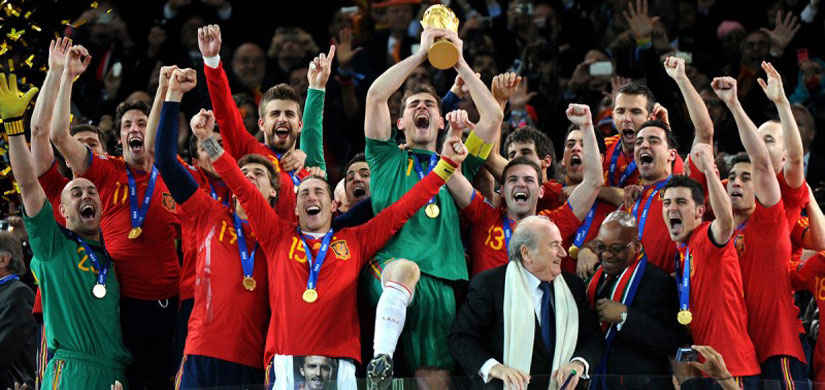You are in:
- Area of Communication and Media |
- Other News
Start of main content
Princess of Asturias Awards 09/07/2010
The Spanish National Football Squad, 2010 Prince of Asturias Award for Sports

©FPA
The Spanish National Football Squad has been bestowed with the 2010 Prince of Asturias Award for Sports. The Jury for the Award announced its decision today in Oviedo.
The triumph of the Spanish National Football Squad in the World Cup, after having won the European Championship, has become one of the most important achievements for Spanish sport at an international level. Their exemplary way of understanding football, based on sportsmanship, fair play and teamwork, has brought millions of people together around a team that has made history.
The Spanish National Football Squad has achieved in 2010 their most outstanding victory in their 90 years of history: the World Cup in South Africa, the most important international competition of national teams that the FIFA organises. Directed by coach Vicente del Bosque, the Spanish Team that won the World Cup on 11th July in Johannesburg was made up of goalkeepers Íker Casillas, Víctor Valdés and Pepe Reina; defenders Raúl Albiol, Gerard Piqué, Carlos Marchena, Carles Puyol, Joan Capdevila, Sergio Ramos and Álvaro Arbeloa; midfielders Andrés Iniesta, Xavi Hernández, Xabi Alonso, Cesc Fabregas, Sergio Busquets, Javier Martínez and David Silva; and forwards David Villa, Fernando Torres, Juan Manuel Mata, Fernando Llorente and Jesús Navas.
The Spanish Team won the World Cup after playing seven games, loosing only the first of them. In the first round, after loosing against Switzerland (1-0), they beat Honduras (2-0) and Chile (2-1). In the round of 16, they won against Portugal (1-0), going through to the quarter finals in which they won against Paraguay 1-0. In the semi-final against Germany, Spain won 1-0, and in the final, they beat The Netherlands in the extra time with a goal from Andrés Iniesta.
The welcome to the players and coaching staff of the Spanish National Football Squad brought together thousands of people in the streets throughout the country. The FIFA, which granted Spain the Fair Play Award, included six Spanish players in their All-star team of the World Cup and named Vicente del Bosque the Best Coach of the World Cup. The goalkeeper Casillas received the Golden Glove Award for best goalkeeper and the Asturian David Villa, with five goals, was the second top scorer of the championship. After winning the European Championship and winning the ten matches of the qualifying round, Spain established themselves as the fan’s favourites to win the World Cup in South Africa 2010. The title of World Champion gave Spain the first place in the FIFA World Ranking.
The Spanish National Football Squad was created in 1920 with the aim of representing Spain in the Olympic Games in Antwerp (Belgium). The team played its first official match on 28th August against Denmark, winning 1-0. Spain ended up earning its first bronze medal. On the second World Cup, which was held in Italy in 1934, Spain played its first final. Throughout its history, the Spanish team played in 13 World Cups and was the host country in 1982. It has also participated in 8 European Championships, winning the trophy in 1964 and 2008. In 1964 Spain was the host country, and won the final against the Soviet Union by 2-1. In June 2008, Spain won its second title after beating Germany by 1-0.
The Prince of Asturias Foundation’s statutes establish that the aim of the Awards is to acknowledge and extol ‘scientific, technical, cultural, social and humanistic work performed by individuals, institutions, groups of individuals or institutions at international level’. Consonant with this spirit, the Prince of Asturias Award for Sports ‘will be bestowed upon the person, institution, group of people or group of institutions whose lives are not only examples to others, but who have also reached new heights in man’s quest to surpass himself and whose efforts have contributed to the advancement, nurturing, promoting and dissemination of sport’.
This year a total of 18 candidatures from Cyprus, Ecuador, Ethiopia, France, India, Italy, Morocco, Sweden, Thailand and Spain ran for the award.
This is the seventh of eight Prince of Asturias Awards to be bestowed this year for the thirtieth time. The Prince of Asturias Award for the Arts went to American sculptor Richard Serra, the Prince of Asturias Award for Social Sciences was conferred on the Archaeological Team of the Warriors of Xi’an (China), the Prince of Asturias Award for Communication and Humanities was jointly bestowed on French and Polish sociologists Alain Touraine and Zygmunt Bauman, the Prince of Asturias Award for Technical and Scientific Research went to biochemists David Julius, Baruch Minke and Linda Watkins, the Prince of Asturias Award for Literature was given to French-Lebanese writer Amin Maalouf and the Prince of Asturias Award for International Cooperation was jointly bestowed on the Transplantation Society and the Spanish National Transplant Organization.
The Prince of Asturias Award for Concord will be announced next 15th September.
Each Prince of Asturias Award, which date back to 1981, comprises a diploma, a Joan Miró sculpture representing and symbolising the Awards, an insignia bearing the Foundation's coat of arms, and a cash prize of 50,000 Euros. The awards will be presented in the autumn in Oviedo at a grand ceremony chaired by H.R.H. the Prince of Asturias.
End of main content
Sección de utilidades
Fin de la sección de utilidades
- Legal document Legal document (Access key 8)
- | Privacy policy Privacy policy (Access key )
- | Social networks ???en.portal.pie.menu107.title???
- | Cookies ???en.portal.pie.menu110.title???
- | Site map Site Map (Access key 3)
- | Contact Contact (Access key )
- | XHTML 1.0
- | CSS 2.1
- | WAI 'AA
© Copyright 2024. FUNDACIÓN PRINCESA DE ASTURIAS





